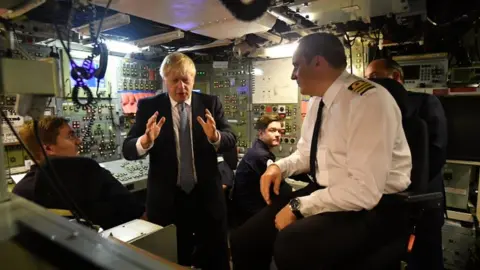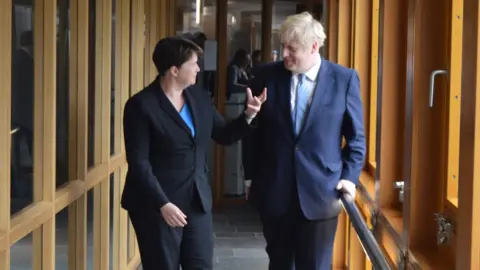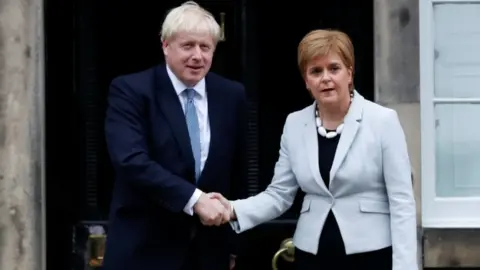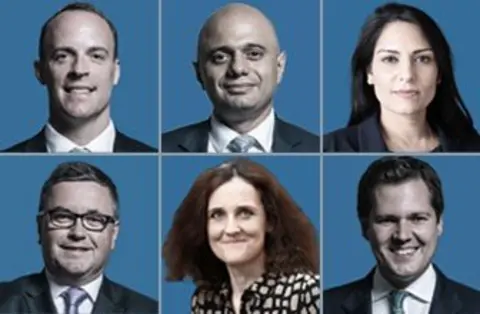Boris Johnson to 'hold out the hand' for new Brexit deal
Boris Johnson has pledged to "hold out the hand" and "go the extra thousand miles" to strike a new Brexit deal.
During a visit to Scotland, the prime minister said the existing withdrawal agreement negotiated with European leaders was "dead" and had "got to go".
However, he said there was "every chance we can get a deal".
But Scotland's First Minister, Nicola Sturgeon, said Mr Johnson had set the UK on an "almost inevitable path to a no-deal Brexit".
Preparations for leaving the European Union without a withdrawal deal are being ramped up, with Mr Johnson saying the UK must leave the EU by 31 October.
While in Scotland he met Ms Sturgeon and Scottish Conservative leader Ruth Davidson - both of whom have positioned themselves against a no-deal exit.
Two committees have been set up as the UK government intensifies preparations for a possible no-deal exit, including a "daily operations committee" of senior ministers.
Meanwhile, the pound has sunk to a 28-month low against the dollar, apparently due to concerns about Brexit.
Speaking at the Faslane naval base near Glasgow, Mr Johnson said his "assumption is that we can get a new deal", but said it was "responsible for any government to prepare for no deal if we absolutely have to".
'Withdrawal agreement is dead'
He said: "I don't want the UK to be aloof or hanging back, I want us to engage, to hold out the hand, to go the extra thousand miles, and what we want to do is make it absolutely clear that the backstop is no good, it's dead, it's got to go.
"The withdrawal agreement is dead, it's got to go. But there is scope for us to do a new deal.
"We will make it very clear to our friends - we're talking to the Irish today - what the limits are and what we want to do.
"We're very confident that with goodwill on both sides, two mature political entities, the UK and EU, can get this thing done."
 Getty Images
Getty ImagesMeanwhile, the prime minister's chief Brexit negotiator, David Frost, has urged his EU counterparts not to "underestimate" Mr Johnson or his commitment to the 31 October deadline.
'Strengthen the union'
Mr Johnson has faced scrutiny over his Brexit strategy from colleagues and opponents alike during his visit to Scotland.
Ms Davidson has previously said Mr Johnson has her "full support" in his efforts to secure a withdrawal agreement with the EU, but that she will not support a no-deal Brexit.
After a meeting at Holyrood, the Scottish Tory leader said the pair had discussed their "shared determination to strengthen the Union", adding Mr Johnson had "made clear the government's preference is to leave the EU with a deal".
Mr Johnson, meanwhile, said he was Ms Davidson's "number one fan".

Was meeting Ruth Davidson the PM's trickiest task in Scotland?
Analysis by BBC Scotland editor Sarah Smith
 Scottish Conservatives
Scottish ConservativesBoris Johnson's toughest meeting might not have been with Scottish First Minister Nicola Sturgeon, but rather Scottish Conservative leader Ruth Davidson.
Ms Davidson made no secret of the fact that she did not want Mr Johnson as PM. And in the few days since he took charge relations have already gone further south.
He ignored his Scottish leader's advice not to sack the Scottish Secretary David Mundell and replace him with the pro-Brexit MP Alister Jack. He then further snubbed the Scottish contingent of parliamentarians when he put an MP who sits for an English seat into the Scotland office as a minister.
Ms Davidson has said publicly that she would not support a no-deal exit from the EU and that as leader of the Scottish party she does not have to sign up to any loyalty pledge to support a no deal.
She believes the PM would have sacked her if he could. But he can't - and she will take full advantage of her ability to speak out.

Ms Sturgeon - who hosted Mr Johnson at her official Bute House residence - has also pledged to fight against a no-deal exit, saying it would cost 100,000 jobs and "plunge the economy into recession".
Speaking after what she described as a "very lively exchange" with Mr Johnson, she also said she believed he was really pursuing a no-deal Brexit.
"He says he wants to get a deal, but what is not clear to me is how he intends to get from the very hard-line, fixed position that he's taken to a position where a deal is possible, if the EU also sticks to the very consistent position it has taken," she said.
"That makes me think that whatever Boris Johnson is saying about his preference being to strike a deal, in reality he is pursuing a no-deal Brexit."
She added that she had made clear to Mr Johnson her opposition to Brexit and no-deal and that the people of Scotland should be able to "choose their own future".
A No 10 spokesman said the PM told Ms Sturgeon he "was a passionate believer in the power of the Union" and "would work tirelessly to strengthen the United Kingdom and improve the lives of people right across Scotland".
Mr Johnson said his preference was to negotiate a new deal that abolished the backstop - but the UK would be leaving the EU on 31 October "come what may", the spokesman added.
 Reuters
ReutersMr Johnson also used his trip to Scotland to announce funding for projects to boost the economy in Scotland, Wales and Northern Ireland.
However Scottish Finance Secretary Derek Mackay claimed the £300m "isn't new funding" and was already under negotiation before Mr Johnson became prime minister.
Welsh Labour also hit out at the funding plans, calling them "very thin stuff" which would not make up for a "chronic lack of investment".
The UK government, however, insisted the money was new, with Scottish Secretary Alister Jack saying city deals would help "create jobs and boost local economies".
The growth deal plan comes after Mr Johnson announced a £3.6bn towns fund over the weekend, which will initially support 100 places in England.
As part of his visit to Scotland, the prime minister also announced plans for a new Office for Veterans' Affairs within the UK government, to coordinate medical treatment and training and "ensure no veteran is disadvantaged because of their service".
The prime minister also plans to go to Wales to meet members of its farming community and Northern Ireland to discuss ongoing efforts to restore devolution at Stormont.

Boris Johnson's government
Who is in charge of what?

